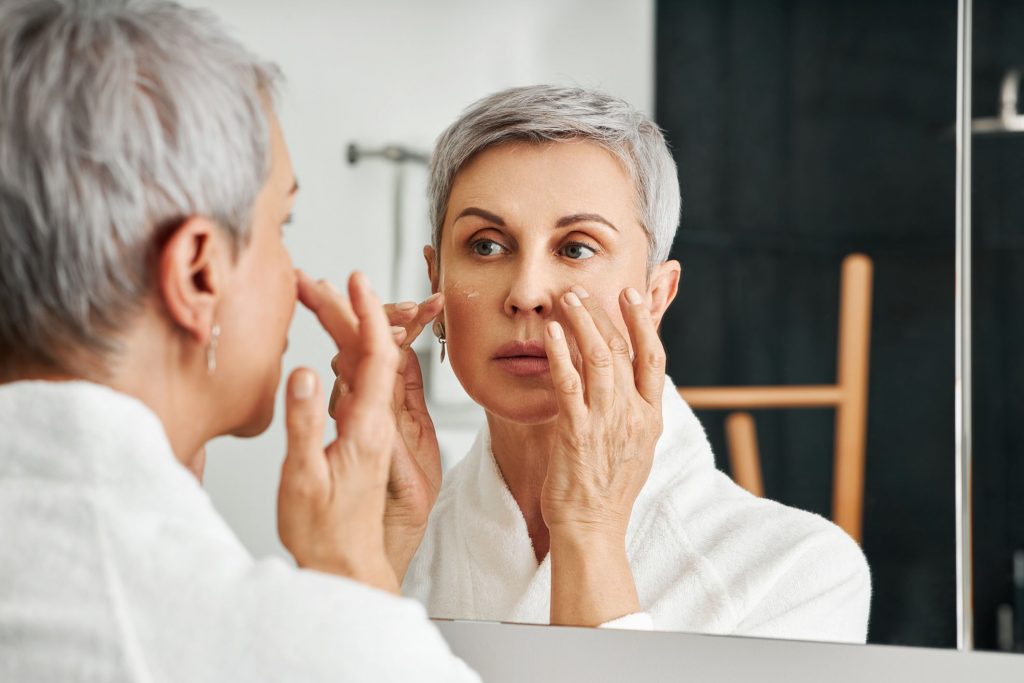

Skincare should always be a part of our everyday routine, just like brushing our teeth twice a day, a skincare routine should be part of our norm. However, when it comes to Menopausal Skincare, women should address skincare changes when they see and experience changes within their bodies.
Perimenopause and Menopause, like puberty, begin at different ages for all women. This can be based on genetics, lifestyle, illnesses etc … When you notice changes in your mood, energy, temperature, and see and feel changes in your skin’s texture, elasticity and hydration levels, then it’s time to address these new skin concerns.
Women and those who experience menopause may see and experience these changes to their skin –
Unfortunately, this damage happened years previously, often during childhood. From neglect over the years and lack of protection on the skin (SPF) the pigmentation has deepened in colour and more damage has been caused. Women may also notice that their ‘usual’ skincare products do not suit their skin anymore, they may get a mild response to products or ingredients that they have always used. Some fabrics may also cause irritation to the skin and also foods &/ drinks, especially alcoholic beverages can cause reactions or responses that would have never happened previously.
Women beginning their menopausal journeys need to look at what can nourish their skin, look at including ingredient’s such as – hyaluronic acid for hydration, antioxidants such as Vitamin C / B to ease inflammation and protection from free radicals, tyrosinase inhibitors to help suppress pigmentation and melanin accumulation in skin and most importantly sun protection factor (SPF) the main antiaging ingredient you can apply to the skin, protection against blue light, the environment and UV, both from an aesthetic and health perspective.
Prohibit the use of a harsh ingredient that may dry the skin out further – Salicylic Acid, or harsh mechanical exfoliants especially on the face. Some people may also have to lower the percentage or the regularity of retinols and Glycolic Acids in their routines for a period of time if the skin is in a responded state. This usually is only for a short period until the skin regulates and with a treatment plan, can reintroduce these more potent ingredients again.
As with any in-salon treatments, a full consultation must take place first to fully assess the client’s skin and lifestyle before recommending an in-house treatment plan. This would be a first port of call as there is no one size fits all when it comes to skin care. Lactic Acid is a beautiful ingredient, when applied in peel form helps to brighten and refresh the skin. LED light treatments can be added to facials and peels or as a standalone treatment to work on inflammation and pigmentation.
Skin Care routines should be morning and evening based, working on protecting the skin throughout the day and preventing and nourishing at night while our body rests. Masques should become a normal part of a skincare routine again, including ingredients such as Lactic Acid or plant-based AHAs often used every 7-10 day.
Lifestyle changes are so important during this phase in life, from a full body health perspective, not just in skincare. If sleep patterns are being affected, look at cutting back on caffeinated drinks and introduce decaffeinated or preferably herbal teas, such as camomile in the evenings, to help induce sleep. Introduce Sleep Hygiene into your life, simple steps to encourage a more restful night’s sleep.
Exercise and fresh air. 20 – 30 minutes of movement per day will help to clear your head, joint movement and to get circulation pumping around the body.
Seek advice from your local Health Shop advisors, they can be a mine of information when it comes to supplements that can help and assist during, pre and post menopause.
Mindfulness – not just taking time out to rest and listen to meditations and or read books, which are both very important. But to also be mindful of the changes you are experiencing and to listen to your body, from skincare to movement, mental and physical health and to acknowledge these changes.
As with anything knowledge is power, seek help and advice from professionals – Estheticians, Health Shop Advisors, nurses, GPs. Online can be a great source of information, but be careful what you do read, as not all advise is legitimate. For those experiencing heightened responses seeking the advise and medical help of an Endocrinologist can be life altering. There are many health podcasts now specially based on this topic – see Dr. Mary Ryan.
As the saying goes, a problem shared is a problem halved. Speak with family members, especially female and see what changes they experienced as often these changes can be hereditary. Your friends and peers can often be the best source of advice and comfort.





8:30am - 6.30pm
8:30am - 4.30pm
8:30am - 4.30pm
Call/Email for apointment
086 3950629